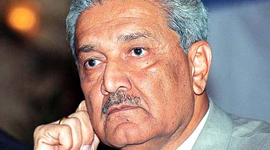
 Can Pakistan’s nuclear scientist A Q Khan be on a secret hit list of the frighteningly efficient Mossad of Israel? He could, particularly since six of his closest associates, all nuclear scientists from the Khan Research Laboratories (KRL), apparently are.
Can Pakistan’s nuclear scientist A Q Khan be on a secret hit list of the frighteningly efficient Mossad of Israel? He could, particularly since six of his closest associates, all nuclear scientists from the Khan Research Laboratories (KRL), apparently are.In a recent book on the history of Israel’s ace spy service Mossad, the author, Gordon Thomas, says that after they traced the travel paths of Khan’s associates to Saudi Arabia and Tehran during Mahmoud Ahmedinejad’s regime, Mossad moved these scientists from their "detain" list to their "kill" list.
‘Gideon’s Spies’ records how Mossad got into the job of tracking Khan after al-Qaida’s No.3, Khalid Sheikh Mohammed, revealed to US investigators in 2003 of a dirty bomb plot in the US.
Soon after, the book relates, Mossad told the US that Khan had travelled to Afghanistan to meet Osama bin Laden in April 2003, along with another nuclear scientist, Murad Qasim, a leading expert in the intricacies of centrifugal technology in the Khan Laboratories.
The publication of book coincides with revived fears that the proliferation network established by Khan, who was last week released by a Pakistani court, could easily be resurrected with his old associates again footloose.
In his book, Thomas says that in May 2003, Khan hosted six nuclear scientists at his home in Rawalpindi – Murad Qasim, Muhammed Zubair, Bashiruddin Mahmood, Saeed Akhtar, Imtiaz Baig and Waheed Nasir. All had earlier helped out with the North Korean nuclear project. Bashiruddin Mahmood, one of the scientists who had been "dropped" by the Pakistan government, had actually admitted to meeting Osama and Mullah Omar, but told Pakistani investigators that he had refused their demand for a dirty bomb.
After Khalid Sheikh Mohammed revealed their names to US officials, these scientists disappeared from Pakistan. By 2004-2005, they were visible in Saudi Arabia, though by that time Khan was under house arrest. By October 2005, the book says, Mossad traced Khan’s associates to Tehran, a week after North Korea transferred liquid propellant to Iran for its Shahab 3 missile.
That’s one possibility. The other is that it would not take too much to resurrect the Khan network. Interestingly, Khan’s release last week came soon after two Swiss brothers – Marco and Urs Tinner – indicted in selling nuclear technology from Khan’s labs to Libya, were freed after three years in detention. A few months ago, another key member of the Khan nuclear network, Buhary Abu Tahir Sayed, a Sri Lankan held in Malaysia, was also quietly released.
Sources said Dawood Ibrahim has been known to put his organised crime network to the use of Khan’s nuclear blackmarket, allegedly through a Dubai company, which has apparently disappeared. And he’s on the loose.
In other words, the basic elements of Khan’s nuclear network are free and able. But as B Raman, terrorism analyst, points out, "This time, the danger is not that Khan will supply to other governments, but could be available for help to anti-US, anti-India jihadi groups like al-Qaida." After all, Khan and Osama both reside within the same political boundaries.
Probably in anticipation, the US last month imposed financial sanctions on a number of Khan’s associates. The state department sanctions include individuals and entities such as Selim Alguadis, Kursad Zafer Cire, Muhammad Nasim ud Din, EKA Elektronik Kontrol Aletleri Sanayi ve Ticaret AS, ETI Elektroteknik Sanayi ve Ticaret AS, Tradefin Engineering, Muhammad Farooq, Daniel Geiges, Paul Griffin, Peter Griffin, Abdul Qadeer Khan, Shamsul Bahrin bin Rukiban, Buhary Seyed Abu Tahir, Gotthard Lerch, Gerhard Wisser and Shah Hakim Shahnazim Zain.

Be the first to comment